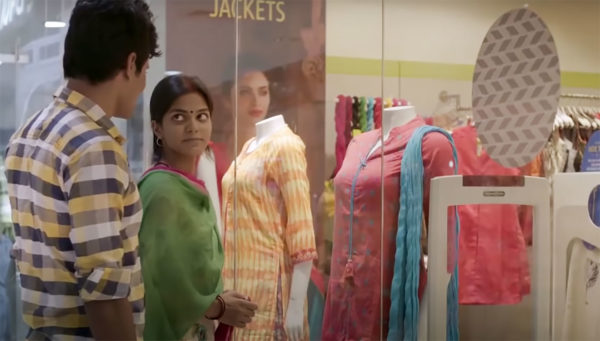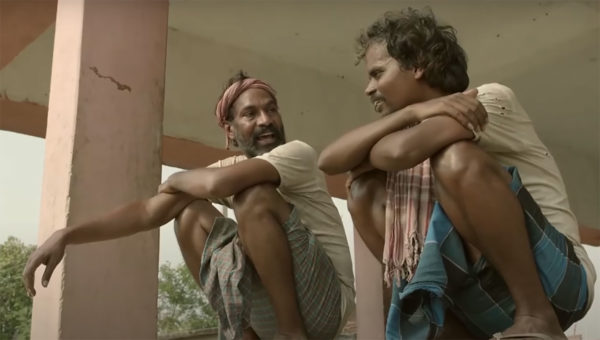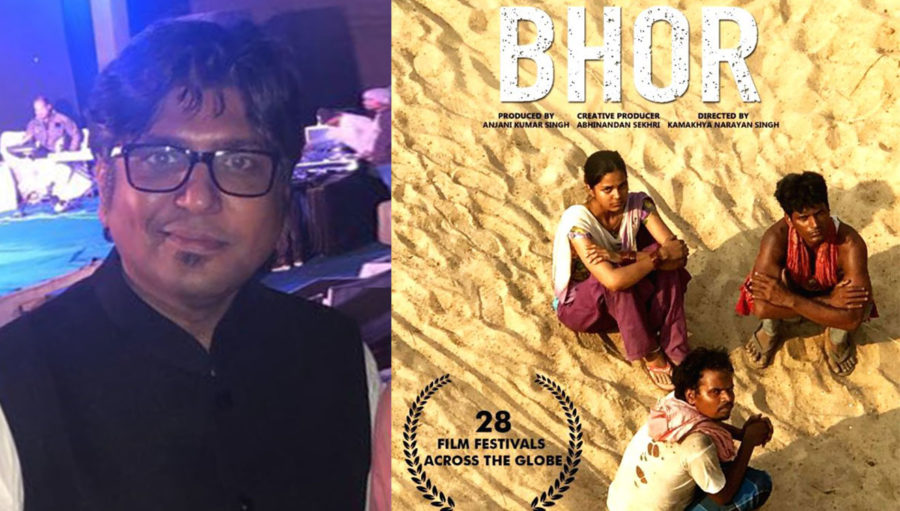Bhor (dawn), Kamakhya Narayan Singh‘s directorial debut, deals with sanitation issues that breed across India. With Bihar’s musahar or the ‘rat-catchers’ community at the centre of the plot, Bhor revolves around a girl named Budhni, who is the first musahar to rank first in the district, and the community’s reaction to her education and demand for a toilet in her house.
With no concept of the oppressed and the oppressor, Bhor, starring Saveree Gaur, Nalneesh Neel and Devesh Rajan in lead roles, is the closest cinema can come to reality. And that was exactly what Singh’s motive was- to tell a story “without creating conflict”.
“What is cinema? It is about what you see. I bring something new to the table. There are certain stories unheard of, or little told, we have the responsibility to bring that to people. So, I felt that in the last three to four decades, we have been telling that thakurs [the upper castes] are really bad. But I wanted to bring out a story, where without creating conflict within society, without creating conflict within yourself, you can bring changes. And that was the main view of the story,” he said in a conversation with Silverscreen India.
Budhni and the plot
Speaking about Budhni, played by Gaur, Singh said, “See, in that community, even the boys could not do something like that. She is not the first musahar woman to top, she is the only musahar. So, she is ahead of the boys as well. Her thoughts, ideas are sharper than the boys in her society.”
“Then, the reaction of the educated members of the family to issues of sanitation, as against that of the uneducated members of the family. When we thought of doing this story, I thought ‘why not a thakur?’ because I have seen these people [thakurs] in and around my village, and a lot of them are good and helping people. So, I wanted this to come out,” he said.
While the thakurs have not been demonised, the women are not collecctivised either. Despite several women on-screen, only Budhni has dialogues. She does not gather the women, nor lectures them on self-respect, although she is mindful of her own.

Interestingly, it is the thakur that Budhni’s husband’s family serves, that decides that Budhni be sent to school even after marriage.
Singh said,”Whatever we say, we are a male-dominated society. It is men who decide for women. You go to villages, things have changed now, but it’s a slow process. If you show one woman reacting and others silent, then that’s because they are educated the way she is. So, she reacts to it and you need a man to help her out, on one hand, and it is also the same man who does not accept her. It is from both perspectives. So, it is a society where the men make all the decisions on behalf of women. So, the protagonist’s marriage is fixed by the father with the advice of the mother. It is not the mother who decides.”
Singh’s film does not provide the afflicted women with a discourse or guidelines to help end their misery. He said, “Because I am an activist, I have seen movements happening across the country. They are a single person discourse and because everyone has their feeling in their hearts. Once a person starts speaking, then it becomes a movement. The media takes it up and everything happens. Similarly, here, Budhni takes the lead, and slowly people come. That’s what the ending was. When people came in support of.”
Who are the Musahars?
Hailing from Bihar but born and raised in Guwahati, Singh said, “I have been seeing musahars since childhood. For me, I have always seen them differently. Musahars are poor people but very simple people. They did not cry for anything. So, I thought of the ways in which the development has not reached them, the reservation, the political independence, what others [other lower castes or Scheduled Castes] get, they have not been able to do it. And they are independent people, as in, their soul is independent. So, when they receive education, especially girls from their society, how they react to it. Their reaction to when a member of the family is educated, while others are not. So, that is the story.”
Musahars belong to one of the lowest rungs among the Scheduled Castes and are far from enjoying any benefits of government schemes.
Sanitation
“People have been talking about sanitation for the last few years. Jayram Ramesh and the UPA [United Progressive Alliance] government also spoke about how the railway lines are the largest toilets of the of the world. Then [Narendra] Modi ji came in and made the Swachh Bharat movement. So, it struck me then that why not make a movie on sanitation. Another point was that of the musahars. Musahars are also beneficiaries. Then the third point was that because I have seen musahars quite closely and am an activist as well, I thought this was the right time to make a film on the issue,” Singh said.
The Swachh Bharat Abhiyan or Clean India Mission was launched by Prime Minister Narendra Modi in 2014 to improve waste management and end open defecation. As a result, films like the Akshay Kumar-starrer Toilet: Ek Prem Katha, were released and renowned public figures brought on board to help spread awareness.
“My film is not about toilets. My film is about the last person, how he reacts to toilets, to education, to everything,” Singh said. In Bhor, the thakurs go out in the open to defecate.
Discrimination, in the conventional sense of the term does not exist.
Migration
However, despite the general issue being sanitation across India irrespective of rural or urban spaces, Bhor highlights rural India. Singh explains that he wanted to “highlight the migration issue more than the issue of sanitation” that is at hand.
“So, you go [to the city] for the good things but you get only the money. Apart from that, everything goes worse in the city. So, migration causes more problems. So, if you start looking for more options in the villages and the government starts working in the villages more, then I think migration won’t happen and that is why I wanted this to be highlighted. I kept the last fifteen minutes for that.”
Making of Bhor
“I wrote the story central to a village, and we know some known actors, so we thought why not approach them. Because I am a documentary filmmaker, I wanted it to be very real. They said that they did not have two months’ time to do workshop. Most of our actors live in the urban areas. So, they had lost their empathy. The way they have to talk, the way they have to be behave, as the villagers. So, for that they needed time. And I was a first time director,” Singh said.

Casting director Dilip Shankar suggested Singh to try fresh faces.
“We thus, went to the villages. So, it’s not just the migration of labours, it is the migration of actors as well because most of the actors in Bihar have migrated to Delhi or Mumbai. And so, had to audition in these cities. Took them to the village for a couple months for the workshop, which was not for acting, but for their body language. That took two months and you can see them now.”
Bhor is not a star-driven film and was shot in a village that falls midway between Nalanda and Nawada, in Bihar.
“It was not like I did not have the money and had to seek help from my friends. I had the money and thus, wanted to hire the best. But when I approached them I realised that they are more open to working with bigger banners and more experienced directors. And I was a first time director.”
In one such instance, he shared, “I wanted a costume designer to work for me. He said, ‘I will come to Patna, give you all the costumes and my assistants will help you there at the location’. Because the location was 100 kilometres from Patna, he did not come on board either. And the kind of costumes they wanted to do for me was to buy new clothes, dye it in tea that will make it look worn-out and used. I did not want that. So, we started sourcing out clothes from the villages, and making our characters wear them. So, this was a hurdle in itself.”
“I am not a big director but I wanted to pay everyone. So, when we went over-budget, I was a bit skeptical because I was told that no one would buy my film. But it went to the festivals, was accepted well, people started talking about it and now it’s on MX Player, I am happy and satisfied.”
Recommended
Calling the digital space, a “democratic” space, he said, “It has become more democratic. If your content is good, people will like it. You definitely make films for the biggere screens with more detailing, but OTT has given you the opportunity where you at least reach the audience. At least people watch it and talk about it. So, it’s a good thing. It is the democratization of the entertainment industry where the people have the option to consume different types of products, and the makers have a platform to reach out to people.”
The film took one year to shoot and then premiered in almost 20 film festivals across the globe.
Singh’s next project is going to be a geo-political film. He said, “I am thinking of something on Jammu-Kashmir and will come up with a script soon.”
Bhor is streaming for free on MX Player.



